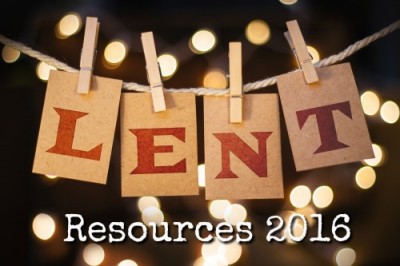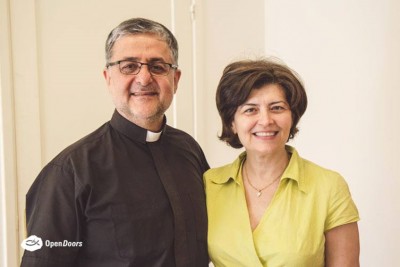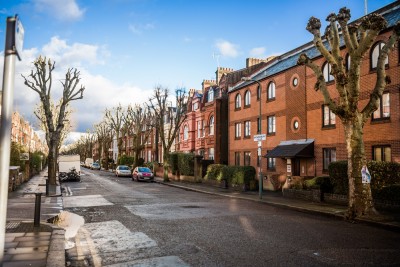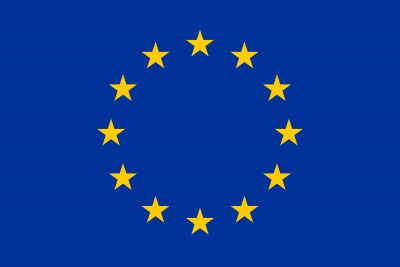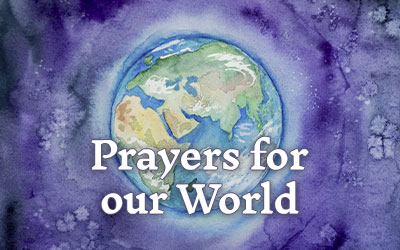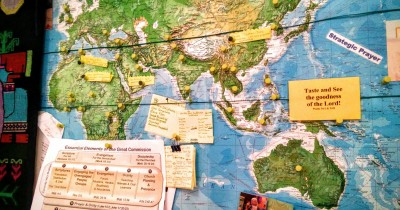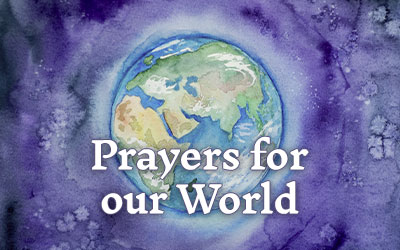Praying through Lent 2016
03 Feb 2016At the World Prayer Centre we believe that prayer is foundational to everything we do as Christians. The 40 day season before Easter is traditionally marked in many churches as a time to discover more about God through prayer and fasting. Here are some resources to encourage and equip us from ministries we commend to you.
BEYOND THE LETTER BOX
The Neighbourhood Prayer Network's Lent Resource is designed for individuals, home groups or whole Church engagement. Each week has a scripture and one neighbour challenge for the week. For those of us who would like to do one small thing each day (Sunday's excluded as a day of rest), there are an additional 33 suggestions for you. There are also 7 prayer themes each week. The whole resource is 20 pages long and costs just £1 per booklet. www.neighbourhoodprayer.net
The Fast UK
KEEP BLESSING YOUR COMMUNITY
Network Norwich Call to Prayer's latest blessing booklet can offer an inspirational 40-day prayer guide that would lend itself well to daily prayer throughout Lent. Each day has a short declaration, scripture, blessing and prayer linked with one of the many names of God, to be spoken over the city, town or village where we live. £3.00 + postage and packing orders to E: This email address is being protected from spambots. You need JavaScript enabled to view it.
CATCHING THE WAVE
This is a 40-day prayer guide encouraging us to pray for our communities and to pray for revival ideal for us during Lent produced by the organisers of TryPraying www.thereishope.co.uk/resources/
Try praying is for people who don't do church. The Try Praying booklet & app includes a simple challenge to try praying for seven days and see what happens. www.trypraying.org
PASSIONART: BE STILL celebrates Lent with a creative twist.
Onsite in six of Manchester's most iconic city centre venues, comprising of contemporary installations, paintings, sculpture and live performances by internationally renowned and local artists, uncovers moments where the sacred inhabits the ordinary. This year's vision is to call our busy city to "be still.... and know that I am God" www.passionart.guide/about/
Online access to 40 days reflections.
FAST AS YOU CAN
The Filling Station Network's plan is to pray and fast for Lent, which starts on the 10th of Feb, and pray for the Lord to work powerfully across the nation, Europe and the USA. Using the fasting model practiced by Daniel in the Old Testament, fast from 'rich foods, wine & delicacies' not total abstinence, as part of this prayer life. Find out more.
24-7 PRAYER – Lent podcasts www.24-7prayer.co.uk
Prayer Breakfast
03 Feb 2016We would like to extend a very warm invitation to you to have breakfast with us and take a unique opportunity to hear from one of the pastors who works in Damascus.
Pastor Edward is coming to Birmingham on SATURDAY 27 FEBRUARY and the two ministries of Open Doors and World Prayer Centre are partnering together to host a morning of hearing Edward speak, having chance to ask some questions and pray together. This is a significant visit for Pastor Edward to this nation and we would urge you in the strongest way possible to come to this event as we feel he has important things to share with us all.
Pastor Edward said, "I want to express my deep appreciation for the people in the West who keep us Christians in Syria in their prayers. My wife and I are thankful that we are still in Damascus. It is not in our own power that we are there, but it is through God's intervention in our lives. Your prayers encourage us. Through them we can encourage others. We have a deep sense of peace and both believe that this peace is a gift from God, so we can stay in the country to encourage our people and to relieve some of the suffering."
We are meeting at the home of Birmingham Vineyard, Network House, in Barford Street, Digbeth. The morning will take the form of breakfast at 8:00am along with the chance to hear Pastor Edward speak. There will also be an opportunity to hear about partnering with Open Doors and their work with the persecuted church including plenty of complimentary resources available to equip your church in prayer. This will be followed by a more open time of sharing and a call to prayer for one of the great issues facing the global church, that of our persecuted brothers and sisters in Christ. The morning will finish prompt at 12noon.
Download the invitation and to book a place, email This email address is being protected from spambots. You need JavaScript enabled to view it. or call 01993 460015 so that have an indication of numbers for catering. For more info see our websites :www.worldprayer.org.uk or www.opendoorsuk.org. We would appreciate you letting us know by Friday 29 January if you are going to be there.
Praying for communities
03 Feb 2016At the World Prayer Centre we believe that prayer is foundational to all evangelism and social action. Here are some resources to encourage and equip us from ministries we commend to you.
PRAYING FOR OUR NEIGHBOURS
This is very much on the Father's heart at the moment and there are many different ways to do this. The Neighbourhood Prayer Network's vision is to see every street in the UK covered in Christian Prayer. Their resource book Neighbours, Transform your Street: Bringing prayer to our neighbours, Bringing Community back to our Streets (Sovereign World) brings together all the resources from partner agencies such as Ffald-y-Brenin Local Houses of Prayer, Adopt a Street, Love your Streets, Lighthouses of Prayer, etc. The invitation is for everyone to sign up on the website and receive a weekly email. More information: www.neighbourhoodprayer.net
HELPING THOSE WHO AREN'T 'RELIGIOUS' TO PRAY
Trypraying is for people who don't do church. The TryPraying booklet includes a simple challenge to try praying for seven days and see what happens. There is an adult, youth and children's versions. The invitation is to use it and then lose it (i.e. give it away) and can be used by individuals, small groups, churches and it has been very effective when a whole town or city uses it. "This is the only thing I have come across in the last 30 years that I have been willing to give away to friends and colleagues. It is nicely produced, starts with where people are at rather than expecting them to come to 'our position' and is completely non-cringe. In short, it's brilliant!" Church leader. For more information and to download a preview copy www.trypraying.org
PRAYING FOR OUR SCHOOLS: Every school in the UK a prayed-for school! That's the vision of Pray for Schools: to mobilise Christians to support their school communities through prayer. You can do this through starting a group to pray regularly for your local school; having schools prayer as a focus for your church or praying as an individual for a school near you. http://www.prayforschools.org
PRAYING FOR THOSE WHO ARE MUSLIM
The Mahabba Network exists to motivate and mobilise ordinary Christians to love their Muslim neighbours in word and deed, and to help churches to mentor and multiply dynamic communities of disciples. Mahabba means 'love' in Arabic. www.mahabba.co.uk
PICKING UP PRAYER
Picking up Prayer is praying through the streets of your village, town or city while picking up litter. This method of praying gets Christians out of their churches and homes and onto the very streets they want to see transformed. The primary aim is to bring blessing onto the streets, both physically and spiritually. http://churchplus.info/prayer/picking-up-prayer
WORLD PRAYER CENTRE BOOKLETS
Guides to: Prayer Walking; Praying Scripture; Praying for a Nation; The Persecuted Church; Children & Young People; Health Care Professionals; People at Work; Unsaved Family & Friends . £1.00 each or set of 8 for £5.00. New guide will be available March 2015: A Guide to Blessing; The Call of the Watchman £1.00 each or set of 10 for £8.00. www.worldprayer.org.uk
EU Referendum
03 Feb 2016Watching and Praying over the UK's relationship with the EU
Now is the time to watch and pray over the next stage of the negotiations that are taking place between the UK and the rest of the European Union nations.
The decision over whether we 'stay in' or 'leave' the European Union has the potential to bring significant division into every area of our society in the UK. As the body of Christ we need to be on our guard in prayer over our families, churches, communities, businesses and governments asking that His kingdom will come and His will be done in and for the UK as well as for the rest of Europe.
On 2nd February the draft deal, that David Cameron and his team have negotiated, was published by European Council President Donald Tusk who writes: 'To be, or not to be together, that is the question which must be answered not only by the British people in a referendum, but also by the other 27 members of the EU in the next two weeks. This has been a difficult process and there are still challenging negotiations ahead. Nothing is agreed until everything is agreed....The clear objective is to have an agreement of all 28 Member states at the February European Council (18-19 February).'
Representatives will meet on Friday this week (6th) to have the first discussion of the proposal.
Our Father in heaven hallowed be your Name
- Lift the name of Jesus high over all these negotiations
- Worship Him as Lord of every nation in our continent
We pray for your kingdom to come
- Through all the negotiations still to take place
- In the areas of sovereignty, competitiveness, protecting non-euro countries and migration, benefits, employment and security
You will be done on earth as it is in heaven
- Give wisdom and discernment to Donald Tusk (Head of the European Council); David Cameron and all the other EU member state leaders and their teams of advisors.
- In the summit of all EU leaders on 18-19 February with a just and righteous outcome
Give us today our daily bread
- For wisdom in the choice of a referendum date.
- For clear and balanced reporting by the media
Forgive us our sins as we forgive those who sin against us
- Lord, have mercy on us as a nation.
- Lord, have mercy on us as your church.
- Lord have mercy on Europe
Lead us not into temptation but deliver us from evil.
- Help us as a nation to show compassion and uphold your justice.
- Help us as your church to share your love and talk about Jesus.
- Where there is division, tension, deception let us bring your peace and integrity
For the kingdom, the power, and the glory are yours now and for ever
- We pray that your name will be glorified across our continent.
- We bless every nation with the blessing of your shalom peace.
Amen.
For a 12 minute video testimony, Whatcom Story: Waves of Glory www.lowpc.org
For more information, contact Jason Hubbard <This email address is being protected from spambots. You need JavaScript enabled to view it.>.
Pray with the ION Prayer Teams today for the Oral & Oral Bible-less at 2pm (EST).
Dial: 1+ (712) 432-0926
Access Code: 373000#
Visit the ION Website: http://orality.net
Praying for the Unreached Oral and Bible-less.
Join us in prayer for the Oral and Bible-less around the Globe.
Those people groups which have: NO Bible * NO Jesus Films * NO Online Audio NT * NO Audio Recordings
Some might have a few believers.
We are united prayers for translation projects that will bring not only portions of Scripture (which is good) but whole Bibles in Heart Languages (which is the best).
Pray for the Spirit of Wisdom and Discernment to those working on translation projects and those looking to do a translation project.
May the Holy Spirit bring them to a place of accelerated translation which produce Scripture that will bring whole people groups out of darkness, and into His light and Salvation in Christ Jesus. Lord quicken us to feel the need and the urgency in a real way that will prompt us to persistently prevail for the Every and All.
Prayer Points
* Ask the Holy Spirit to grant wisdom and favor to missions agencies, independent organizations and churches that want to focus on the need for Scripture in every heart language.
* Pray for the Lord to soften the hearts of the peoples groups who still wait. So that as the Scriptures are released, hearts are ready to receive the gift of Salvation. Let them be receptive to the Word & the Gospel Stories.
* Ask God to raise up prayer teams who will begin breaking up the spiritual soil of these people groups through worship and intercession.
* Ask the Lord to bring forth a triumphant Church for the glory of His name!
Teach us to pray
Before we pray, like the disciples in Luke 11:1, simply ask, “Lord teach me to pray.”
Father we come before You asking that You empower us by Your Spirit to persist in prayer for the Oral & Oral Bible-less.
Forgive us Lord – for we confess that more often than not we have been more concerned with our own needs, than in the needs of others around the globe. May the need of the people groups around the globe of not having Scripture be made known in such a way as to facilitate and propel us as believers to begin to call upon You to change our hearts, so that all selfishness will be put to death in us, so that we might truly serve others in love by advocating for Scripture in the Every and All...
For our ION Orality Training Friends:
You can now post your Orality Training Events to the new ION Website:
Here are the complete instructions for adding an event.
- Visit the website: http://orality.net... 2. If you haven't already, create a user account by clicking 'Register' in the top left
- Log in by clicking 'Log in' in the top left
- When you are logged in, add an event by hovering over 'Events' and Clicking 'Community: Submit Event'
- Fill in the details and press 'Submit Event' at the bottom - the event will only show up on the Calendar once it has been approved by a site administrator.
https://www.facebook.com/oralitynetwork/posts/973647362706365




I just received information today the Television of Papua TVRI Papua broadcast the seminar day 1 about How to raise up children in prayer 30 minutes. Tomorrow TVRI Papua will broadcast seminar day 2 about how to raise up mission kids and also teaching about salvation 60 minutes. They broadcast to all 44 district of Papua also in the village. Please pray many people and kids who watch the television will receive Jesus Christ and also become children in prayer...world changer children.
The U.S. Supreme Court on Monday rejected North Dakota's bid to revive a restrictive Republican-backed law struck down by a lower court that would ban most abortions once a fetal heartbeat can be detected, as early as six weeks after conception. The court turned away the state’s appeal, leaving in place a July 2015 ruling by the 8th U.S. Circuit Court of Appeals that blocked the 2013 law. North Dakota’s law was among the strictest of a series of statutes passed at the state level imposing limits on abortion. The law was challenged by North Dakota’s only abortion clinic, the Red River Women’s Clinic in Fargo.
In a separate case, the high court is due to hear arguments on March 2 in a challenge by abortion providers to parts of a restrictive, Republican-backed Texas law they contend are aimed at shutting clinics that perform the procedure. It will be the court’s first abortion case since 2007.
In the North Dakota case, the appeals court had said it was bound in its ruling by U.S. Supreme Court precedent on abortion, which holds that states may not prohibit abortions before a fetus reaches viability. But the appeals court said “good reasons exist” for the high court to re-evaluate its past abortion decisions in light of medical and scientific advances that show the concept of viability is subject to change.
Republican backers of the North Dakota law had said 40 years of medical advancements should not be ignored. Opponents said a ban at six weeks would mean abortion would be outlawed at a gestation time when many women do not yet even know they are pregnant. On Jan. 19, the high court refused to hear a similar case in which Arkansas sought to revive a Republican-backed law also blocked by lower courts that would ban abortions after 12 weeks of pregnancy.
The high court legalized abortion in 1973, but abortion remains a contentious issue among Americans. Some states, particularly those governed by Republicans, have sought to chip away at a woman’s right to end a pregnancy by passing laws imposing a number of restrictions.
Viability, according to medical experts, occurs around 23 to 24 weeks into a pregnancy. Lawmakers in North Dakota, Arkansas and other conservative states have sought to ban abortions at an earlier stage, citing among other things hotly debated medical research suggesting a fetus feels pain starting at 20 weeks of gestation.
The North Dakota case was 15-627, Stenehjem v. MKB Management, U.S. Supreme Court, No. 15-627. (Contributor: By Lawrence Hurley for Reuter News Service – Editing by Will Dunham)
Intercessors are disappointed that the Supreme Court will not hear the Arkansas and North Dakota cases. The court’s decision ignores conclusive evidence proving unborn babies are alive and feel pain in early pregnancy. God is still extending mercy, even to those who wantonly take these innocent lives. Pray much that age and the 2016 elections will pave the way for new Supreme Court justices.
“Justice is turned back, and righteousness stands afar off; for truth is fallen in the street, and equity cannot enter. So truth fails, and he who departs from evil makes himself a prey. Then the Lord saw it, and it displeased Him that there was no justice.” (Isa. 59:14-15)
http://www.getamericapraying.com/blog/on-watch-in-washington-january-27-2016/
